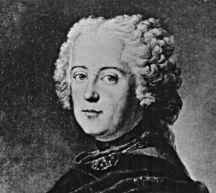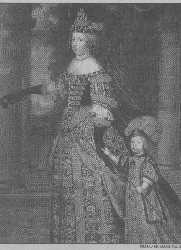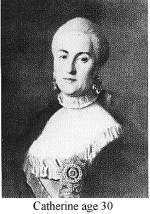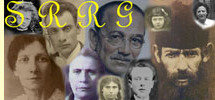|
People of Power
The Sovereigns

Frederick II of Prussia, born 1712
Reign 1740-86(8)
|

Empress Maria Theresa, born 1717
Reign 1740-1780(9)
|

Catherine the Great II of Russia, born 1729
Reign 1762-96(10)
|
In the early 1700s, three monarchs: King Frederick II of Prussia, Empress Maria Theresa of Austria, and Empress Catherine the II of Russia set out on a course to enlarge their territoritorial domains by annexing land from Poland-Lithuania. Two essays, discussing Polish History, (each with a different emphasis), enlarge the view of the political and social scene of the times.
History of Poland
Decline and Partition
The Reign of Anarchy:
The wars of the 17th. Century had left Poland ruined; her population had decreased by a third and the victory at Vienna wasthe Commonwealth's last military success. The need for reform had become obvious even during the reign of Zygmunt III Vasaand the Jesuit preacher, Piotr Skarga, had blamed social injustice as the main cause of evil. The general decline was especially noticed in the Sejm; the parliamentary system grew awkward and ineffective as deputies used the notorious "Liberum Veto", which allowed any deputy to prevent legislation since all resolutions had to be carried unanimously.
The idea of consensus rule was, in principle, a good one but the "liberum Veto" was first used in 1652 by a deputy in the pay or power of a magnate. It soon became obvious to Poland's neighbours that the veto could be used to their own political ends andthey soon clubbed together to "defend Polish freedoms". The "szlachta" themselves, becoming less influential as they lost their military valour and, in many cases, impoverished, saw the veto as the last symbol of their ability to play a role in the running of the Commonwealth.
The Decline of Poland:
In 1697 the Elector of Saxony, Augustus, was elected King. From 1700 - 1721, Augustus II allied himself with Russia and became involved in war with Sweden for control of the Baltic (the Great Northern War). Poland became a battlefield and the Polish throne the prize. In 1704 Sweden won, Augustus was removed and the Voivode of Poznan, Stanislaw Leszczynski, was elected in his place. In 1709 the Russians defeated the Swedes at Poltava and Augustus was returned to the throne.
Conflict between Augustus and the Sejm almost ended in civil war in 1717, only prevented by a Russian offer of mediation; 18,000 Russian troops surrounded the chamber where the deputies met, they were denied the right to speak whilst the Russian "mediator" dictated the Russian " solution". This Sejm became known as the "Dumb Sejm" and the Republic became little more than a Russian client state; this was the start of the Russian "Protectorate" in which Poland was forced to reduce her standing army. On Augustus' death, in 1733, Leszczynski was again elected King but the Russians interfered by sending in an army and rerunning the election; Augustus' son, Frederick Augustus, was elected.
The sixty-six years of Saxon rule, from 1697 - 1763, were a national disaster and drove the country to the brink of anarchy. Most ominous was the fact that in 1732 Russia, Prussia and Austria had entered into a secret alliance to maintain the paralysis of law and order within Poland. This pact became known as the "Alliance of the Three Black Eagles" (since all three powers had a black eagle in their coat-of-arms).
The reign of the magnate, Stanislaw August Poniatowski, 1764 - 1795, a favourite of Catherine the Great, Empress of Russia, was totally controlled by Russia. Poniatowski was to become the last King of Poland.
From 1768 - 1772, an anti-Russian rising known as the "Confederation of Bar" was crushed by the Russians. Over 5000 captured "szlachta" were sent to Siberia. Among the few who escaped was Kazimierz Pulaski who was to play an important role in the United States' struggle for independence.
The Partitions of Poland: 1772 - 1795.
Taking advantage of a now weakened Poland, Prussia, Russia and Austria agreed to annex parts of the country in 1772. The Commonwealth lost 733,000 sq.km (23%) of her former territory and 4,500,000 of her population; Prussia took the smallest, but economically best, area; Austria took the most heavily populated areas, whilst Russia took the largest, but least important. To give the crime some legality the Sejm was forced to ratify the partition in 1773, despite the resistance of some Deputies, led by Tadeusz Rejtan.
Despite the disaster of this first partition, Poland underwent a national revival in 1773, thanks to the efforts of Poniatowski. The first step was the creation of the "Komisija Edukacji Narodowej" ("Committee of National Education"), the first Ministry of Education in Europe. Hundreds of schools were founded and the standard of education was raised. Writers, poets, artists and scholars were encouraged by the King and the ideas of the Enlightenment were taking hold. This was the period of Adam Naruszewicz, the historian, Ignacy Krasicki, satirist and poet, Wojciech Boguslawski, "father" of the Polish theatre, and Franciszek Karpinski, whose hymns are still sung in Poland to this day.
Taking advantage of Russia's involvement in a war against Turkey, the King launched a reform programme (1788-1792) and the task was carried out by the "Four-Year" or "Great Sejm" which established a new Constitution; the Constitution of the Third of May. Established in 1791, under this Constitution the "liberum Veto" was abolished and a majority rule introduced, and personal freedoms guaranteed to all the people. The Constitution was hailed in the United States, England and France, but was seen as a threat to the absolute rulers of Prussia, Austria and, especially, Russia. So, in 1792, at Russia's instigation a handful of magnates led by Ksawery Branicki, Szczesny Potocki and Seweryn Rzewuski betrayed the Commonwealth and formed the Confederation of Targowica against the new Constitution and then "asked" for help. Russian troops crossed the borders and war broke out. The King's nephew, Joseph Poniatowski and Tadeusz Kosciuszko, a veteran of the American War of Independence, put up heroic resistance but all hope faded away when the Prussians joined in, attacking the Polish armies in the rear. Many patriots were forced to flee.
In 1793 Russia and Prussia signed the Second Partition Treaty, seizing more than half the country and about four million more of the population. The last Sejm of the Commonwealth, which met at Grodno, was forced to legalise the partition and abolish most of the reforms of the "Great Sejm".
Popular discontent led to Insurrection, proclaimed by Kosciuszko (as Supreme Commander) in Krakow's Market Place on March 24th, 1794. Thousands of Poles rallied to the standard followed by a victory at Raclawice in which peasant Scyth bearers played an important role. The people of Warsaw, led by the cobbler Jan Kilinski, rose against and defeated the strongest Russian regiment in Poland. Berek Joselewicz commanded the first Jewish military formation since Biblical times. In May 7th, Kosciuszko issued the Polaniec Manifesto which abolished serfdom.
Eventually, in October, the combined strength of Russia and Prussia defeated Kosciuszko's forces at Maciejowice (where he was captured) and, in November, Warsaw was taken by the Russians who slaughtered the population of the suburb, Praga, including women and children.
Then, in 1795, the third partition wiped what was left of Poland off the map. The King was forced to abdicate and taken to St. Petersburg (where he died in 1798). Many captured Poles were sent to Siberia but thousands more escaped to Italy where, in 1797, they formed a Polish Legion, led by General Henryk Dabrowski, fighting for Napoleon Bonaparte against Austria. The Poles hoped that by fighting on the French side against the Powers that had partitioned Poland they could free their country. Dabrowski's Legion wore traditional uniforms which bore the motto: "All free men are Brothers!" They marched to a song written by Jozef Wybicki:
"Jeszcze Polska nie zginiela bugy my zyjemy,
Co nam obca przemoc wziela, szabla odbierzemy.
Marsz marsz, Dabrowski, z ziemi Wloskiej do Polski!
Za twoim przewodem zlaczym sie z narodem."
"Poland is not dead whilst we live,
What others took by force, with the sword will be taken back.
March march, Dabrowski, from Italy's soil to Poland!
Through your leadership we will reunite the nation."
|
When, in the twentieth century, Poland became an independent nation once more this marching song became the National Anthem.(11)
|
Home -
Introduction -
Prologue -
Preface -
Table of Contents -
Chapter 1 -
Chapter 2 -
Chapter 3 -
Chapter 4 -
Chapter 5 -
Chapter 6 -
Chapter 7 -
Chapter 8 -
Chapter 9 -
Chapter 10 -
Guest Book -
References
|
|



